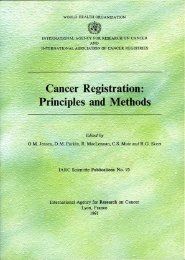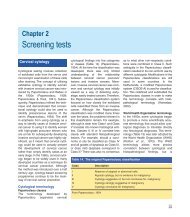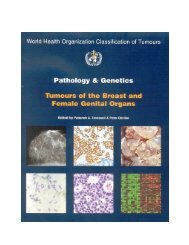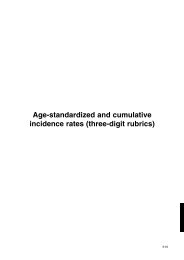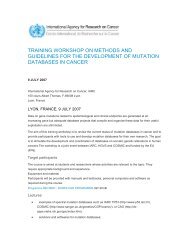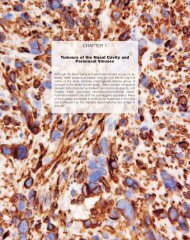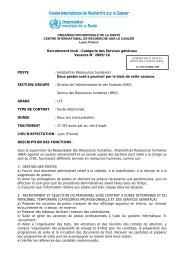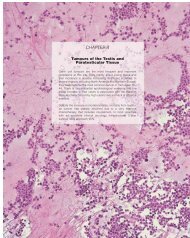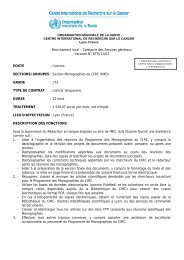world cancer report - iarc
world cancer report - iarc
world cancer report - iarc
Create successful ePaper yourself
Turn your PDF publications into a flip-book with our unique Google optimized e-Paper software.
CANCER CONTROL: A GLOBAL OUTLOOK<br />
SUMMARY<br />
> The aim of <strong>cancer</strong> control is a reduction<br />
in the incidence of the disease and of<br />
the associated morbidity and mortality,<br />
as well as improved quality of life for<br />
<strong>cancer</strong> patients and their families.<br />
> Prevention, screening and early diagnosis,<br />
treatment and palliative care are the<br />
principal approaches to <strong>cancer</strong> control.<br />
> Progress in <strong>cancer</strong> control requires not<br />
only sound knowledge of the disease<br />
process, but also an understanding of<br />
the psychological, social, economic and<br />
organizational factors which govern how<br />
that knowledge can be put to effective<br />
use.<br />
The <strong>world</strong> <strong>cancer</strong> burden is expected to<br />
increase from the current level of about<br />
10 million new <strong>cancer</strong> cases diagnosed<br />
annually to about 15 million in 2020,<br />
largely because of demographic changes<br />
and the effects of tobacco, as well as<br />
other risk factors. It will take time for<br />
<strong>cancer</strong> control measures, even if efficiently<br />
applied and based on well-planned<br />
strategies, to have a major impact on<br />
these figures. However, prevention could<br />
reduce the load by about 2 million by<br />
2020, and 6.5 million by 2040. In contrast,<br />
the impact of both screening and<br />
treatment is likely to be small; even by<br />
2040, half the potential reduction in <strong>cancer</strong><br />
deaths from 16 to 8 million would be<br />
due to prevention, and much less from<br />
more effective screening and treatment.<br />
It is clear therefore that, although on a<br />
short-term basis we cannot ignore applying<br />
effective therapies, for maximum<br />
impact on the <strong>cancer</strong> problem we must<br />
change the priority to prevention. The<br />
prevention of <strong>cancer</strong> should be set within<br />
the context of prevention of all noncommunicable<br />
diseases caused by shared<br />
risk factors, while the links between spe-<br />
304 Cancer control<br />
cific infectious agents and certain <strong>cancer</strong>s<br />
will also permit some of the principles<br />
of control of communicable diseases<br />
to be adopted.<br />
WHO approach to <strong>cancer</strong> control<br />
The increasing magnitude of noncommunicable<br />
diseases, including <strong>cancer</strong>, represents<br />
one of the major health challenges<br />
to global development in the new century.<br />
To respond to this growing challenge,<br />
WHO has given <strong>cancer</strong> control a high priority<br />
in its programme of work and in<br />
technical collaboration with countries.<br />
WHO has also developed, in close collaboration<br />
with its Member States and other<br />
partners, a global strategy for the prevention<br />
and control of noncommunicable diseases<br />
in which <strong>cancer</strong> control is one of<br />
four major priorities. The strategy places<br />
emphasis on the rising impact of <strong>cancer</strong><br />
on developing countries and the disproportionate<br />
suffering it causes in poor and<br />
disadvantaged populations. The global<br />
strategy was endorsed by the 53 rd World<br />
Health Assembly (May 2000), and in its<br />
resolution WHA53.17 the Assembly urges<br />
Member States to establish effective<br />
national programmes, and requests WHO<br />
to provide the necessary technical support<br />
and to coordinate global partnerships<br />
and alliances for advocacy, capacity<br />
building and collaborative research.<br />
WHO is committed to the promotion of<br />
National Cancer Control Programmes as<br />
the most effective national-level strategy<br />
for reducing the morbidity and mortality<br />
from <strong>cancer</strong> and improving quality of life<br />
of <strong>cancer</strong> patients and their families [1].<br />
Medical knowledge is now sufficiently<br />
advanced to permit the prevention of at<br />
least one-third of all <strong>cancer</strong>s, the cure of<br />
a further one-third, given early diagnosis<br />
and the administration of effective therapy,<br />
and the adequate control of pain and<br />
other symptoms, with palliative care for<br />
the remainder.<br />
The development of National Cancer<br />
Control Programmes is a process which<br />
involves the review of the current disease<br />
Fig. 7.1 AIDS information for the general public at<br />
a health centre in Côte d’Ivoire. Effective linkages<br />
with control programmes for HIV/AIDS and other<br />
diseases could facilitate the establishment of<br />
effective National Cancer Control Programmes.<br />
and health care situation, evaluation of<br />
the potential impact of various disease<br />
control strategies (prevention, early diagnosis/screening,<br />
treatment and palliative<br />
care), the setting of goals and priorities<br />
and the allocation of resources. As <strong>cancer</strong><br />
has increased in incidence in many<br />
countries, several have recognized the<br />
need to initiate National Cancer Control<br />
Programmes. However, others have not<br />
yet done so. Because of the increasing<br />
importance of noncommunicable diseases,<br />
including <strong>cancer</strong>, in all countries<br />
WHO is committed to securing recognition<br />
of the importance of <strong>cancer</strong> among<br />
all Member States. This in turn creates<br />
further needs, towards which WHO can<br />
make important contributions by:<br />
- Updating and disseminating information<br />
on effective strategies for <strong>cancer</strong> prevention<br />
and control;<br />
- Developing background documentation<br />
on planning National Cancer Control Programmes;<br />
- Working with interested countries in the<br />
development and evaluation of their<br />
National Cancer Control Programmes;<br />
- Encouraging countries to share experience<br />
and learn from successes and failures<br />
and promote networking at subregional,<br />
regional and global levels.<br />
Goals of National Cancer Control<br />
Programmes<br />
To reduce the burden of <strong>cancer</strong>, a country<br />
must be prepared to allocate a certain




